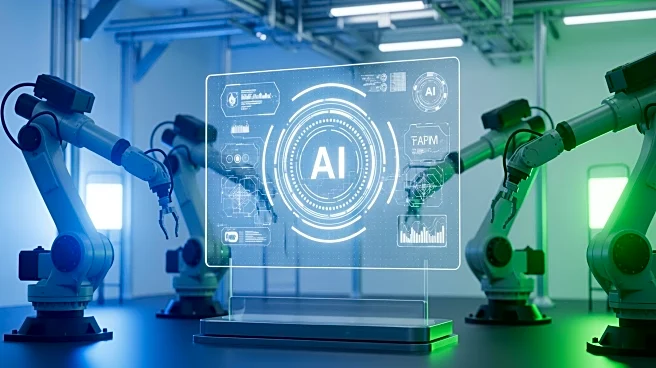What's Happening?
A recent survey conducted by Aleran Software reveals that 91% of 200 U.S. B2B manufacturers have implemented or plan to implement AI-powered sales automation. This marks a significant shift from digital
pilots to real AI adoption, modernizing quoting, pricing, and customer interaction processes that have remained largely unchanged for decades. The survey highlights that four in ten manufacturers identify AI sales agents as a top modernization priority. As supply chain uncertainties and customer demands for speed intensify, AI provides manufacturers with tools to respond faster, quote smarter, and scale efficiently. AI-driven discoverability and AI sales assistants are becoming crucial in enhancing B2B interactions, allowing manufacturers to capture qualified, intent-driven buyers more effectively.
Why It's Important?
The adoption of AI in manufacturing sales is crucial as it addresses outdated workflows and enhances efficiency in customer interactions. By integrating AI, manufacturers can streamline processes, reduce cycle times, and minimize costly errors, ultimately improving margins. This transformation is particularly significant in configure-to-order environments where guided consultation is essential. The shift towards AI-powered sales automation not only empowers sales teams but also positions manufacturers to meet modern commerce demands for faster quoting and richer personalization. As AI becomes a competitive edge, manufacturers ready to scale smarter and sell faster stand to gain significantly in the evolving market landscape.
What's Next?
The next frontier in AI adoption for manufacturers involves agentic AI systems that autonomously handle multi-step workflows, from generating quotes to verifying credit and triggering production. This evolution towards sales orchestration, rather than mere automation, promises to enhance efficiency and provide full visibility for human oversight. As AI continues to empower sales reps and customer service teams, manufacturers are expected to focus on high-value deals and strategic growth. The ongoing integration of AI in sales processes will likely lead to further advancements in customer-friendly CPQ systems, accelerating deals and improving margins.
Beyond the Headlines
The integration of AI in manufacturing sales raises ethical considerations regarding the balance between automation and human involvement. While AI amplifies the impact of sales teams, it is crucial to ensure that human oversight remains integral to the process. The shift towards AI-driven sales orchestration also highlights the need for manufacturers to strategically prioritize areas of value creation, ensuring that AI applications align with both business goals and customer needs. As AI continues to transform the industry, manufacturers must navigate the cultural and operational changes that accompany this technological evolution.









